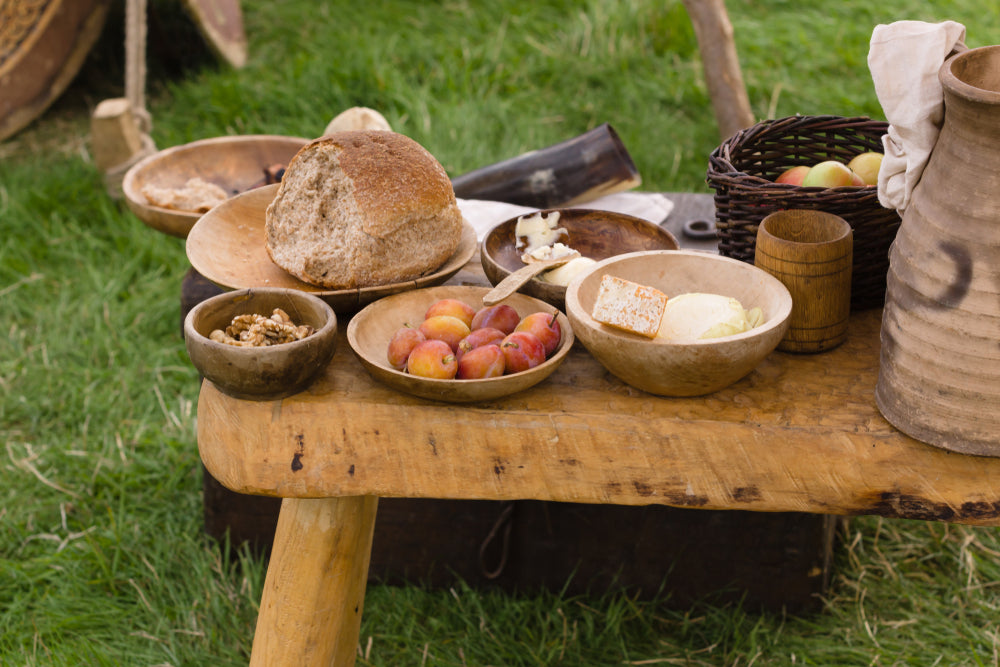Step into a captivating journey through the annals of British cuisine, where the tantalising flavours that grace our plates today have evolved over centuries, shaped by a rich tapestry of cultural influences, historical events, and culinary innovations. With its diverse dishes and distinctive flavours, British food is a testament to the nation's vibrant culinary heritage. From the humble origins of traditional recipes to the sophisticated creations of modern gastronomy, the history of British food unveils a captivating narrative of exploration, resilience, and the ever-evolving palates of its people. Join us as we embark on an immersive exploration, tracing the fascinating roots of British cuisine and uncovering the ingredients, techniques, and traditions that have defined its unique identity.
Ancient Influences: From Roman Roads to Medieval Feasts
The roots of British cuisine can be traced back to the Roman Empire when the arrival of Roman settlers introduced new ingredients and cooking techniques to the land. Over the centuries, the influence of the Vikings, Normans, and other European cultures further shaped British food traditions. From the hearty stews and roasts of medieval feasts to the unique blends of herbs and spices, the legacy of these ancient influences can still be tasted in traditional British dishes today.
The Era of Exploration: Global Flavours and Exotic Spices
The Age of Exploration brought new horizons and a wave of exotic flavours to British shores. Explorers and traders brought back spices, sugar, tea, and other ingredients from far-flung corners of the world. The British Empire's global reach played a significant role in the fusion of international flavours with traditional British recipes. The introduction of potatoes, tomatoes, and other ingredients from the New World revolutionised the British culinary landscape, forever changing how people cooked and ate.
Industrial Revolution: Changing Tastes and Modernisation
The 18th and 19th centuries Industrial Revolution marked a significant shift in British food culture. Urbanisation and the rise of factories led to changes in diet and eating habits. Traditional agricultural practices led to mass production, and convenience became a priority. While some traditional dishes persisted, the industrial era brought new challenges and opportunities, shaping the foundation of modern British food and the emergence of iconic staples like fish and chips.
Post-War Recovery: Resilience and Adaptation
The aftermath of World War II brought rationing and scarcity, forcing the British population to make do with limited resources. However, this period of hardship led to culinary innovation and a focus on self-sufficiency. Victory gardens and the "Dig for Victory" campaign encouraged homegrown produce, and creative recipes emerged to make the most of available ingredients. The recovery years saw the revival of traditional recipes and the birth of new culinary traditions, reflecting the resilience and adaptability of the British people.
Modern Renaissance: A Culinary Revival and Reinvention
In recent decades, British cuisine has undergone a remarkable renaissance. A renewed appreciation for local, seasonal, and artisanal produce has fueled a resurgence of traditional recipes and cooking techniques. A new generation of talented chefs and food entrepreneurs has embraced the wealth of British ingredients, elevating them to new heights of culinary excellence. Combining modern innovation and reconnection with culinary heritage has made British food a dynamic and vibrant part of the global culinary scene.
The Influence of Immigration: A Global Melting Pot
British cuisine has been profoundly influenced by immigration throughout its history. Waves of immigration, from Huguenots to Indian and Caribbean communities, have brought new flavours, ingredients, and culinary techniques to the British culinary landscape. The fusion of diverse culinary traditions has given rise to beloved dishes like curry, balti, and jerk chicken, which have become integral parts of British food culture. These immigrant influences have enriched and diversified British cuisine, creating a vibrant tapestry of flavours and textures.
War and Food Innovation: Necessity Breeds Creativity
During times of war and conflict, British cuisine underwent significant transformations driven by necessity and resourcefulness. The rationing and scarcity experienced during World Wars I and II led to inventive recipes that made the most of limited supplies. Iconic dishes like Spam fritters, Woolton pie, and bread pudding emerged as creative solutions to stretch ingredients and feed the population. These wartime adaptations not only sustained the people but also showcased the ingenuity and resilience of British cooks.
The Rise of Pub Culture: Gathering Places and Gastronomic Delights
The institution of the British pub has played a pivotal role in shaping the country's food culture. Pubs have long been gathering places for communities, where locals gather to enjoy hearty meals and ales. Traditional pub fare, such as Sunday roast with all the trimmings, steak and kidney pie, and ploughman's lunch, have become iconic representations of British culinary traditions. In recent years, pub cuisine has reentered, with gastropubs offering elevated and innovative interpretations of classic dishes.
Influential Cookbooks and Celebrity Chefs
The emergence of influential cookbooks and celebrity chefs has profoundly impacted British food culture. From Isabella Beeton's "Book of Household Management" in the 19th century to modern-day culinary icons like Jamie Oliver and Nigella Lawson, these culinary figures have popularised British recipes and techniques while introducing international flavours to a wider audience. Their influence has sparked a renewed interest in home cooking and celebrating British ingredients.
Sustainable Farming and Ethical Practices:
As awareness of environmental and ethical concerns grows, British food culture has embraced sustainable farming practices and ethical sourcing. From organic farms that prioritise soil health and biodiversity to the commitment to animal welfare, many British producers and consumers are actively supporting sustainable food systems. The emphasis on local and seasonal produce ensures freshness and flavour and reduces the carbon footprint associated with food transportation. British cuisine is increasingly aligned with principles of sustainability and responsible consumption.
The fascinating history of British food is a tapestry woven with ancient influences, global exploration, industrialisation, resilience, immigration, and innovation. From the legacy of Roman roads to the vibrant flavours of medieval feasts, the global influences of the Age of Exploration, the changes brought by the Industrial Revolution, the resilience displayed during post-war recovery, and the modern renaissance of British cuisine, each chapter has contributed to the diverse and dynamic nature of British food. Explore the flavours and traditions of British culinary history with GoodWoods.


 Christmas 2025
Christmas 2025
 Frozen Food
Frozen Food
 Baking
Baking
 Beans, Peas, Soups & Tins
Beans, Peas, Soups & Tins
 Biscuits, Crackers & Cookies
Biscuits, Crackers & Cookies
 Candy / Sweets
Candy / Sweets
 Crisps & Snacks
Crisps & Snacks
 Chemist / Pharmacy
Chemist / Pharmacy
 Desserts
Desserts
 Gravy, Stock & Paste
Gravy, Stock & Paste
 Haggis
Haggis
 Indian Sauces, Paste and Pickle
Indian Sauces, Paste and Pickle
 Jams & Preserves
Jams & Preserves
 Poppy Appeal
Poppy Appeal
 Pot Noodles & Super Noodles
Pot Noodles & Super Noodles
 Scone Mix
Scone Mix
 Gluten-Free / Free From
Gluten-Free / Free From
 Tea Accessories
Tea Accessories
 Teapot & Tea sets
Teapot & Tea sets
 Tea For One
Tea For One
 Sugar & Creamer
Sugar & Creamer
 Tableware
Tableware
 Serveware
Serveware
 Plates & Trays
Plates & Trays
 Bowls
Bowls
 Cups & Saucers
Cups & Saucers
 Mugs
Mugs
 Silverware
Silverware
 Dinnerware - Accessories
Dinnerware - Accessories
 Dinnerware - For Pets
Dinnerware - For Pets
 Victoria Eggs - Hand-Drawn UK Homeware
Victoria Eggs - Hand-Drawn UK Homeware
 Jewelry & Accessories
Jewelry & Accessories
 Sale
Sale
 Christmas Gifts
Christmas Gifts

